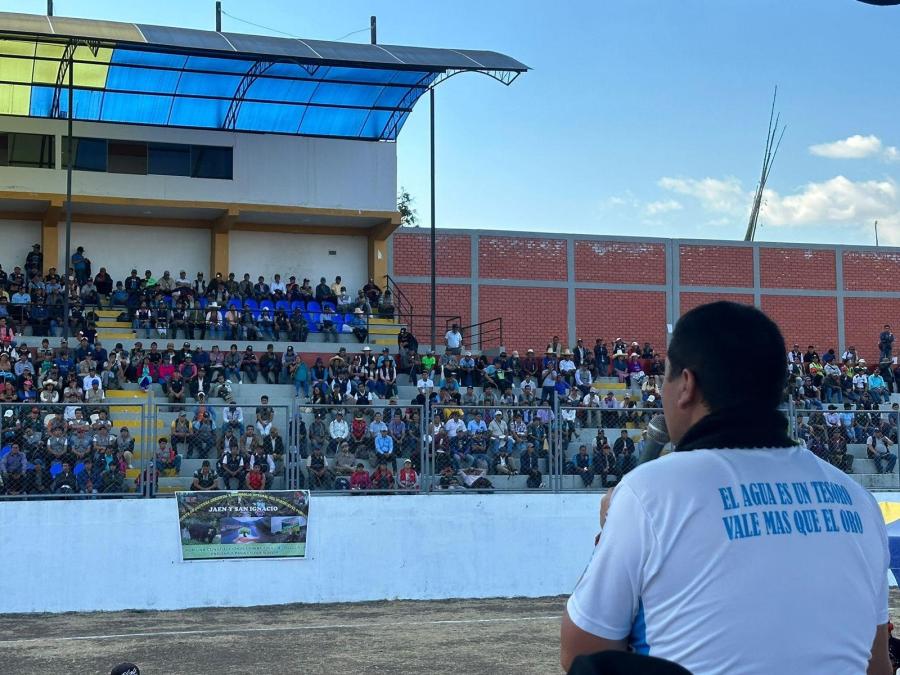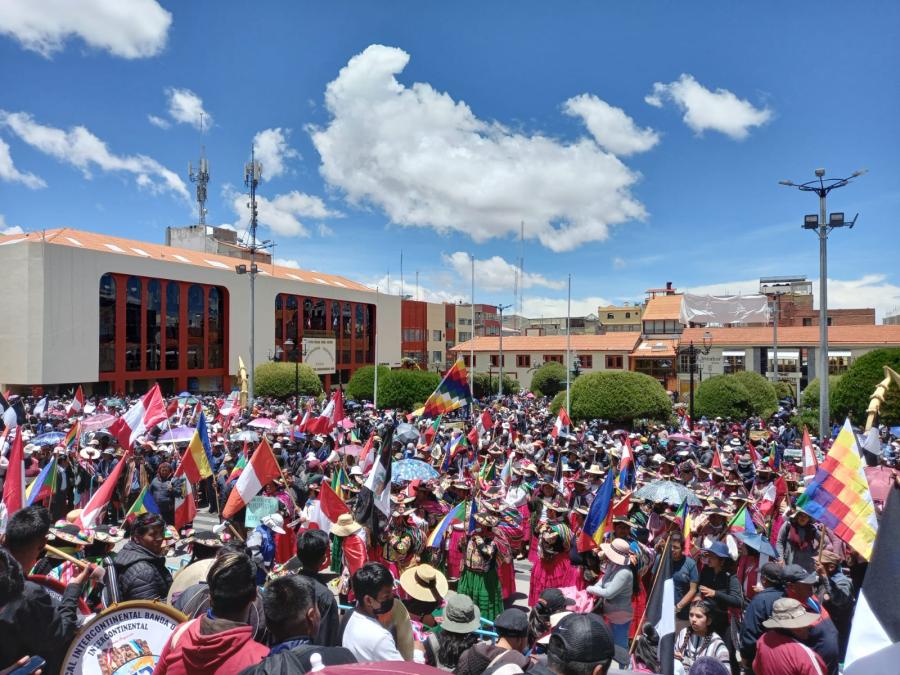Edwin Vasquez, a Huitoto Indian from the border between Peru and Colombia, is a leader in the Peruvian Amazon and vice president of the Interethnic Association for the Development of the Peruvian Jungle (Asociación Interétnica para el Desarrollo de la Selva Peruana, AIDESEP). He is also the coordinator of the Coordinating Body for the Indigenous Organizations of the Amazon Basin’s (COICA) Section on Environment, Natural Resources and Biodiversity (Coordinador del area de Medioambiente, Recursos Naturales y Biodiversidad de COICA).
With regard to the future impacts of Plan Colombia in Peru, one of the most worrisome things for us is the effect that aerial spraying may have on our natural resources, and on the humans who depend on these resources. It’s alarming for us that the Peruvian government has accepted money budgeted to them for Plan Colombia.
Another important impact is the related militarization of the region that borders Colombia. The militarization is entirely a government matter. Our communities are very peaceful. We have initiated nothing with the FARC, the paramilitaries, or the Peruvian military, but sometimes these groups do infiltrate the communities. This could lead to an increase in armed conflicts within our territories. However, we the indigenous peoples are not arming ourselves. We are, however, feeling the effects of this government policy, being implemented as a national security measure. Military bases are being installed in our communities. There is not a single benefit to having them there. If the guerillas see that we have military bases in our communities, they think that we are conspiring with the government against them, and that causes problems for us. Instead of helping keep displaced people out of our communities, the military presence displaces our communities from within their own territory. There is absolutely nothing positive about them being there for us; all of the effects are negative.
Though we don’t have any way of measuring the environmental impacts, I can say that just by setting up their bases, they are destroying natural resources and disturbing biodiversity. Not only that, but they are violating our territorial rights by simply being there.
We have not yet received a single desplazado [displaced refugee]. Previously, there was communication and sharing among our peoples, but now that is impossible. Our Colombian indigenous brothers are not allowed to cross the border because the Peruvian military will not allow them to, thinking that they must be with the FARC. I cannot even go onto the Colombian side to see my brothers, and they cannot come to visit me. They are not with the FARC, but the military has no way of knowing. So, the presence of the military really harms our communities.
I have been told that millions of dollars are to be used to militarize the area, as well as funding for alternate development of crops to replace illicit coca crops. However, for this to work there needs to be participation on behalf of the indigenous communities and the local governments, the municipalities, and the mayor. However, the mayor does not see this as very important; first, because he is not informed enough about the issues, and second, because he simply isn’t interested in it. So, this leads us to believe that the funds from Plan Colombia will never reach us, and that we will not be benefited by them whatsoever.
In Colombia, the situation is complicated by the presence of different actors: the FARC, the paramilitaries, and the national military, but it has not reached that level yet in Peru. Everyone knows that the armed conflict is primarily a Colombia problem, which has not yet reached the Peruvian side. If we have anything to protest about, it is the aerial spraying related to Plan Colombia. It seems that if one thing [the armed actors] doesn’t kill us, another [herbicide spraying] will, because our rivers will be contaminated and our vegetation will die. We do not have a strategy for the armed groups, because these are not an issue for us. Right now, our biggest enemy is the Peruvian military, because they are causing problems in our territories as well as within our communities.
We have considered holding a bi-national meeting to address these border issues, because we have 85 Peruvian indigenous communities along a 1,700-kilometer border and all of us are directly affected. We would like to be able to meet with the Colombian indigenous communities, which are also numerous, to discuss these issues with them and compare effects on our communities. We would also like the international community to be aware of the impacts that we are suffering as a result of Plan Colombia.
I just want to make sure that my comments are not distorted or taken the wrong way. If what we say here [at the June conference in Quito, Ecuador] gets distorted, our enemies will either put us in jail or "fill us with lead." On the other hand, I want to make sure that this information gets out, because people need to be aware of what is going on. I think that many times, people are not willing to accept all of the negative and real impacts that Plan Colombia has brought.
There have not been nor will there be major changes with the new [Peru President Alejandro] Toledo government, because this is a state policy related to national security issues. However, one change is that in [former Peru President Alberto] Fujimori’s government, it was a dictatorship, and there was no room for discussion, whereas now, there is more flexibility and participation for indigenous communities with regard to a range of issues, such as constitutional reform. This is an issue that is now being discussed in the Commission of Andean-Amazonian Peoples [Comisión de Pueblos Andinoamazónicos], which was formed as the result of a presidential decree. In the commission, both governmental and indigenous leaders work together, as well as specialists in indigenous movement issues. Other laws have been proposed and are in Congress right now, regarding traditional knowledge and related issues. These are receiving support for the most part, but there are always opposing parties. The indigenous communities support Toledo’s initiatives to this regard, and are grateful, because he is fulfilling about 80 percent of his commitment to us so far.
The FARC, instead of scaring or putting fear into the indigenous communities, actually supports them. For example, they give us medicine and buy products from our communities. In fact, they help our communities more than the high government commissions that are sent out to us. Our people have to say to these commissions, "What do you have to offer us? We sure don’t want them coming down simply as tourists. Look, what we want is medicine, which the FARC actually gives us, with their own FARC-labeled bottles and everything." This is the reality that the people are living. Another problem is that the Peruvian troops just take our chickens without asking instead of paying us for them like the FARC do. This is what we are experiencing, but whenever we try to report these things, the government is of no help, because it goes against their very principles to admit that this happens.
The FARC’s presence is very different from Shining Path’s [in the 1980s]. With Shining Path, sometimes a community would just become aware that Shining Path was coming through, and by the next day, every single person in the community would be dead. Also, if Shining Path was in a community forcibly, the military would come in and use force against the community because they thought they were with Shining Path, so the community had no way out. For Fujimori to say that he pacified the Shining Path isn’t true. The indigenous communities had a big part in pacifying the Shining Path, and there has not even been a symbolic recognition given to us regarding this. They have not even given us the certificates for the territory on behalf of peace in Peru.
Nataly Fletcher is an independent researcher on issues of contemporary Latin American politics. Cathy Wirth studies urban agriculture. Both were Fulbright scholars in Ecuador.



